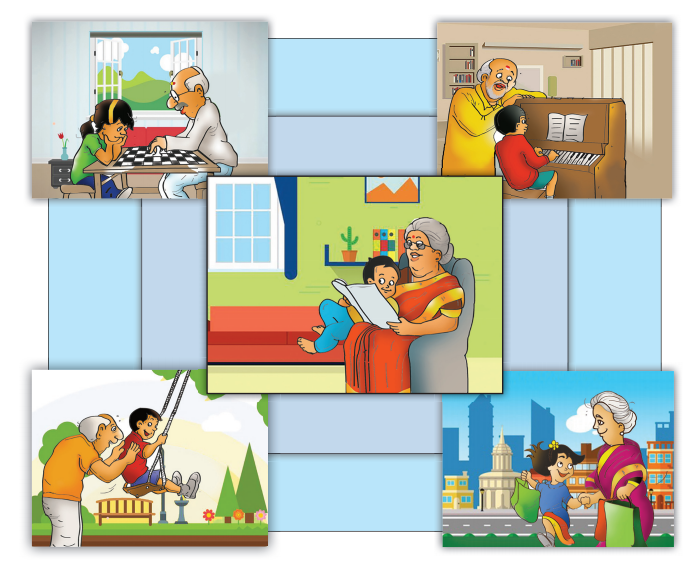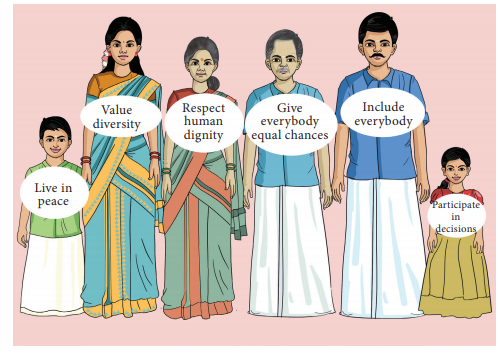Political Science - Citizenship | 11th Political Science : Chapter 4 : Basic Concepts of Political Science Part II
Chapter: 11th Political Science : Chapter 4 : Basic Concepts of Political Science Part II
Citizenship
CITIZENSHIP
Introduction
In political theory, citizenship refers not only to a legal status as a member of a country but also a normative ideal which means the ruled are full and equal participants in the political process. Democracy and citizenship go hand in hand. Democracy focuses on political parties, electoral systems, rule of law, etc., while citizenship focuses on the attributes of individual citizens. Citizens have certain rights that differ from one country to another. Today, we are following a modern state and citizenship connotes a status which is defined as a set of rights and duties of the people.
Are you a natural citizen? or a naturalised citizen
of your country? What are the differences between the two? Natural citizens are
the citizens by virtue of their birth but naturalised citizens are the ones who
acquire citizenship.
Aristotle defined citizenship
with reference to the birth place, family lineage and culture. Stoics viewed citizenship as a
cosmopolitan ideal. Confucius
emphasized it as the restoration of commonwealth, where everyone worked for
harmony and welfare. In India too, there persisted the concept of “Vasudeva
Kutumbakam”.
Citizenship and the City-state:
Citizenship was an important
theme in the ancient Greek and Roman Republics but they disappeared from the feudal
systems. This was later revived as a desirable aspect of civic humanism during
the Renaissance. Citizenship was considered only as participation of duties
during the ancient Athens.
Citizenship was considered as a pivotal importance
to Aristotle as he perceives ideal state is possible only in law-based state
where citizens are law abiding. He states that an individual is a political
animal who finds fulfilment only within the polis and hence desiring for
political posts is natural. He says that citizenship is a criterion wherein the
rule must be applicable to all irrespective of whether they are residents,
aliens or even slaves from other countries. A citizen is one who enjoys the
right to share in the deliberative and judicial offices and is able to exercise
his political rights effectively under the constitutional system.
Marshall’s Analysis
Marshall, a
liberal-social democrat links citizenship to social class
in the context of capitalism. According to Marshall, citizenship has three
essential divisions: civil, political and social. Every individual
requires a right for freedom and that is what is in as civil component. This is
also an important ingredient of rule of law. As a citizen we have the right to
participate in political decision-making process. This is reflected in the
political division. No citizen can be deprived of the prevailing
Aristotle
defines citizenship as “he who
has the power to take part in the deliberative or judicial administration of
any state.”
Greeks enjoyed the privilege of being governed by
democracy; their government was made up of commoners, and they were allowed
freedom of speech to a large extent through public speaking rights.
Standard of living and they have all the rights to
enjoy the fruits of this. Hence, Marshall stresses upon the social
services.
Citizenship and Education
In this, we shall study about the influence of educ
ation towards citizenship, according to various philosophers.
Aristotle
considers three qualities to be necessary for a man universally. They are:
v Loyalty
to the constitution
v High
degree of capacity to one’s duties and
v Quality
of goodness and justice.
A democratic nation upholds political and economic
equality for which identification between a good man and good citizen are
always necessary.
Plato considers
education is a cure to corruption and political instability. Hence, he speaks for
effective and responsible form of education. Aristotle, Hume and
Rousseau , point out that the citizens will need knowledge of
the attitudes and the expectations of their fellow citizens. J.S.
Mill and Tocqueville on the other hand stress upon the need of political
knowledge and in order to participate and conduct the affairs of the local
government, voluntary association or jury service, education is very much
necessary.
Citizenship in India
India is a secular, democratic
and nation state. Why do you think Independence Movement began? The main reason
was to bind together people of different religions, regions and cultures.
Though there were differences with the Muslim League during the Partition of
the Country, yet this strengthened the Indian National Leaders to maintain the
secular and inclusive character of the Indian Nation state.

Discuss
As son/daughter what is your role and
responsibilities towards your Parents? Discuss in the class.
Actually embodied in the
Constitution. The leaders were determined and joined to build the same. The
Indian Constitution attempted to provide full citizenship to all irrespective
of whichever groups they belonged to. Women, people from the Scheduled Castes
and Tribes, remote communities from the Andaman and Nicobar Islands, who had
not enjoyed equal rights previously, were given the full citizenship rights..
In India, Prepare a chart on your idea on the qualities of a good citizen and
share it with your teacher and friends.
The provisions about citizenship
are found in Part II and in the subsequent laws passed by the Parliament
Citizenship can be acquired by birth, descent, registration, naturalisation or
inclusion of territory. There is also a provision in the Constitution that the
state should not discriminate against citizens on the grounds of race, caste,
sex, place of birth, etc. The rights of religious and linguistic minorities are
also protected.
Global citizenship and National citizenship
National citizenship assumes that
our state can provide us with protection and rights we need to live. However,
states today are to tackle a lot of problems and hence individual rights are
guaranteed to protect the safety of the people. Global citizenship on the other
hand, deals with the importance of citizenship across the national boundaries.
Here, one may need the cooperative action by the people and the governments of
many states.

Therefore, citizenship for all
can resolve many socio- economic inequalities. Moreover, global citizenship
reminds us that we live in a world where the states are interconnected with
each other and strengthening the links is most important.
Related Topics